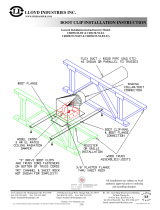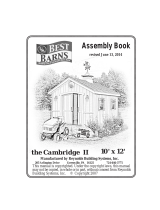Installation Instructions
Please read before installation
866-794-7900
www.speediboot.com
Installing the Speedi-Boot
Step 1
After the location of the vent boot has been
determined, make a measured mark on the left and
right truss-joist for square and straight installations
Step 2 Extend the hanger arms & place one end of
the arms on top of the truss-joist (if possible) for
temporary support. See Figure 1
Figure 1
Step 3
Place the hanger bar feet flush with the bottom of
the truss-joist and hammer the attached nail into
the truss-joist. Install an additional nail or screw
thru the provided pilot hole on either side of the nail
cradle. This prevents the hanger arm from twisting
and the hanger body from flexing during trim
register installation. See Figure 2
Figure 2
Step 4
Slide the hanger body to the desired position and
secure into place by using the lock screw or by
installing a sheet metal screw thru the pilot holes in
the hanger arms into the hanger body. This
additional screw provides added strength. See
Figure 3
Figure 3
Optional Positioning
The hanger arms come assembled on the long side
of the hanger body. A slide stop at the end of the
arms prevents them from sliding apart during
installation.
Step 1
The arms may be removed by sliding the arms
apart with a quick motion separating the two
pieces. Reassemble the arms into the extended
tabs. The hanger arms may be shortened to fit
narrow framing by breaking at the score points on
both arm pieces. See Figure 4
Figure 4
Floor Installations
Step 1
There are four pre-piloted holes in the four
corners of the Speedi-Boot to fasten to the
bottom of the floor decking with sheet metal or
wood screws. You may also use the trim register
pilot holes and the hanger arms to secure to the
floor decking. This creates a tight fit and
compresses the rubber gasket to the floor deck
eliminating air leakage. The hole in the floor
decking must be cut 3/8” larger than the
outer mud-ring dimension.
Figure 5
Dust & Debris Cover
Step 1
The Speedi-Boot’s Dust & Debris Cover prevents
construction dust, debris, texture spray, primers,
paints and stains from contaminating the duct
work system and HVAC equipment. This assists
in maintaining the efficiencies & capacities of the
HVAC system and improves the Indoor Air
Quality of the structure. See Figure 6,7
Figure 6
Step 2
The Speedi-Boot’s Dust & debris Cover may also
be utilized as a plug to perform Duct Pressure
Testing against. This feature will eliminate the
necessity to plug each supply and return location
increasing the Speed of the testing procedure.
Trim Out
Step 1
The Speedi-Boot’s rigid Mud-Ring provides a sturdy
edge for the sheet rock installer to cut against at
each vent boot penetration. This prevents boot
deformation and provides a more consistent and
Speedi trim installation process. See Figure 6,7
Figure 7
Step 2
Pre-Pilot holes in the Speedi-Boot frame provide a
more solid Register trim installation. This provides
Speedi installations and solid register backing that
prevents loose or saggy register trim installations.
See Figure 7








